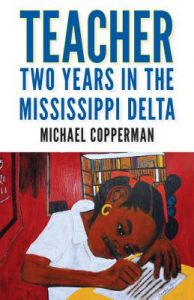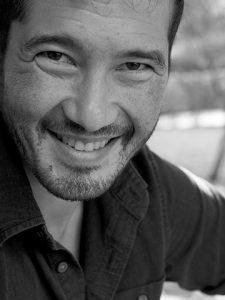From 2002 to 2004, Michael Copperman taught fourth grade in the Mississippi Delta through Teach For America. Today, he teaches writing to students from diverse backgrounds—primarily low-income and first-generation college students—at the University of Oregon. Michael also frontlines The Oregon Writers’ Collective, which fosters a vibrant writing community where emerging writers can connect with one another, discover audiences, and develop their craft.
His writing has received awards from the Munster Literature Centre, the Oregon Arts Commission, Oregon Literary Arts, and Bread Loaf Writers’ Conference, among others. Some of the places his work appears include The Sun, The Oxford American, Guernica, Creative Nonfiction, and Copper Nickle.
Michael’s recent memoir Teacher: Two Years in the Mississippi Delta illuminates his experiences teaching in rural black public schools in Mississippi, depicting clashes between educational ideals and realities. Mario Alberto Zambrano (Lotería: A Novel) called the book “heartbreaking and crucial,” and Katie Williams (The Space Between Trees) called it “a work of tremendous skill, honesty, and heart.”
Allie Sipe is a senior at Southern Oregon University who will graduate at the end of June, after which she will teach in Rhode Island through Teach For America.
AS: Tell us a little about your background. How did you come to serve as a corps member for Teach For America in the Mississippi Delta?
MC: I graduated Stanford, where I’d been a college wrestler and also the chair of the Hapa Issues Forum, a multiracial Asian-American advocacy group—that is, I was driven and social justice oriented. TFA sounded like a good next step, a worthy cause.
AS: Can you talk about translating your experiences with Teach For America into writing a memoir? What did that process look like?
MC: It took me many, many years to write well about the experiences—I needed the clarifying distance of time to be able to reflect and reckon with what the experience came to mean. I wrote long emails to family and friends when I was there which was valuable source material—and I wrote many of the pieces of the memoir discretely, publishing piece by piece.
AS: Did you discover anything intriguing or surprising about your time in the Delta when revisiting your experiences to write your memoir?
MC: I found that while I thought I was full of regret and guilt, what I was finally experiencing was longing to be back there with the kids I taught, who I cared about so much that I had been unable to let go of. I found out that perhaps I had been a good teacher after all.
AS: When reading your book, I was particularly struck by the gap between educators’ idealistic goals for students and the incredibly difficult realities those students endure. At one point, you refer to this as teaching “children with so much promise and so little opportunity.” Can you speak a little more about that?
MC: I went to Mississippi imagining that I could remake the world—take the burden and consequences of slavery and racism and segregation and poverty and create justice, which is to say, give deserving children a chance to learn and so realize the American dream through education. That proved far more difficult than I knew, as teaching is an art, and while what teachers do does resonate out of sight, it does so invisibly through years and years. I left believing I’d failed.
AS: One of my favorite parts of your book was reading the notes that students wrote to you and left in your mailbox, as well as reading the poems students wrote in class. Especially in the poetry assignment where students used metaphors to write about their past, present, and future, students’ authentic voices came to life. Why was poetry such an appropriate vessel for students’ voices and stories?
MC: Those kids, who spoke AAVE in the particular Delta variation of Southern idiomatic English—well, they had style and verve and an ear for rhythm, and they knew the world they inhabited, which was rough and bleak at times, but also beautiful, and richer for the intensity of their experiences. Their voices were dazzling because poetry freed them from the burdens of grammar conventions which were not native, and because poetry, when freed from the stuffy halls of academia, values life and affirms it, raw and vital and present.
 AS: Near the end of your book, you write that, “Teach For America’s merit is that it bridges the gap between worlds.” After reading your book, your work now as a professor at the University of Oregon who works with low-income, first generation students seems to be a commitment to this work of bridging gaps. How would you say that your experiences with TFA in the Delta inform you as a writing teacher today?
AS: Near the end of your book, you write that, “Teach For America’s merit is that it bridges the gap between worlds.” After reading your book, your work now as a professor at the University of Oregon who works with low-income, first generation students seems to be a commitment to this work of bridging gaps. How would you say that your experiences with TFA in the Delta inform you as a writing teacher today?
MC: The lessons I learned in Mississippi are the lessons I relearn today, again and again, in teaching students who have often come from difficult backgrounds—not to make assumptions, but to listen. To value students’ experiences and try to make them matter in how learning happens, so that one’s identity is not erased. Patience, compassion, kindness.
AS: Do you have any advice for emerging teachers and writers?
MC: Teach with passion—if you don’t care, why should your students? Write from the heart—puffery, tricks, and cleverness don’t hold up, but the truth does, even it is itself insufficient.
AS: Thanks so much for talking with us.

 Follow
Follow